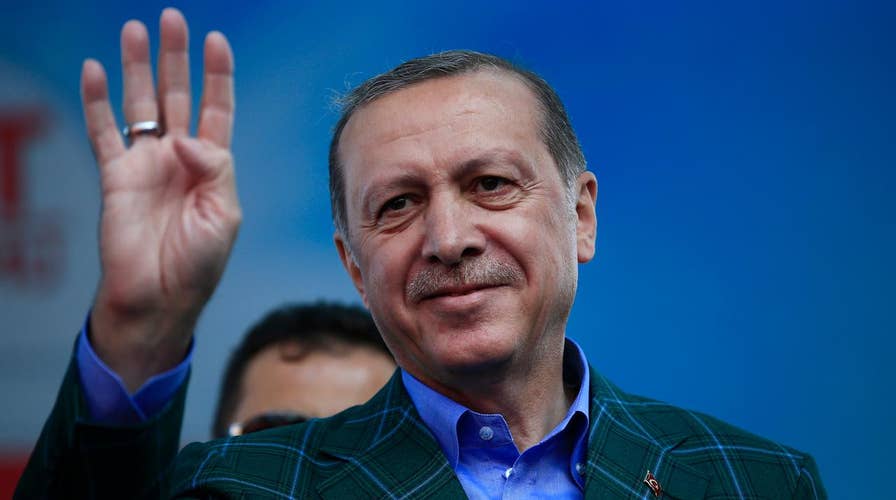EU observers cry foul at vote to expand Erdogan's power
Turkish referendum gives president much more power than other branches of government; David Lee Miller reports from Jerusalem
WASHINGTON – Ignoring concerns raised by international monitoring groups, President Donald Trump called Turkish President Recep Tayyip Erdogan on Monday to congratulate him on the country's contested referendum greatly expanding presidential powers.
The move comes despite protests from opposition parties and international monitoring groups -- as well as Trump's own State Department -- about voting irregularities during Sunday's referendum. And it aligns Trump with a leader who has taken on an increasingly authoritarian bent.
Voters Sunday narrowly approved constitutional amendments that will replace Turkey's parliamentary system with a presidential one. Under the new system, the president will be able to appoint ministers and senior government officials, issue decrees and declare states of emergency.
Opposition parties have complained of a series of irregularities, including an electoral board decision to accept ballots that did not bear official stamps, as required by Turkish law. International monitors from the Organization for Security and Cooperation in Europe said the move undermined safeguards against fraud.
Earlier Monday, U.S. State Department spokesman Mark Toner echoed the concerns raised by the OSCE, pointing to "observed irregularities" on voting day and "an uneven playing field" during the campaign.
Erdogan, meanwhile, called the referendum "the most democratic election ... ever seen in any Western country" and admonished the OSCE monitors to "know your place."
Critics argue the reforms in Turkey will hand extensive power to a man with an increasingly autocratic bent and leave few checks and balances in place.
Underscoring the complicated relationship between the U.S. and Turkey, the White House readout of Trump's call also noted the pressing issues on which the U.S. has tried to work with Turkey, namely fighting the Islamic State group and quelling Syria's civil war.
Earlier Monday, the White House had sidestepped questions on the referendum, with spokesman Sean Spicer saying the U.S. wanted to let an international commission review the results.
"They have a right to have elections and their people participated in that," Spicer said. "Before we start getting into their government system, let this commission get through its work."
Erdogan had a bumpy relationship with Trump's predecessor. President Barack Obama initially viewed Erdogan as a possible model for a new generation of Muslim leaders and traveled to Turkey early in his first year in office. The two men spoke frequently during the start of Obama's tenure.
But as Erdogan took a turn toward authoritarianism, his relationship with Obama worsened.
Last year, Obama said there were trends in Turkey that he was "troubled with," including a fierce crackdown on the press.
"There is no doubt that President Erdogan has been repeatedly elected through a democratic process, but I think the approach that they've been taking towards the press is one that could lead Turkey down a path that would be very troubling," Obama said in an April 2016 news conference.












































